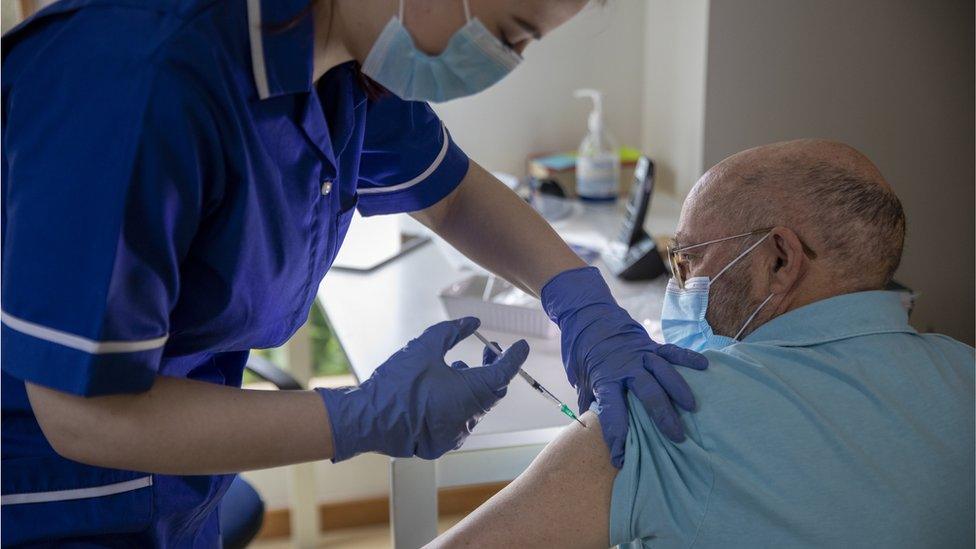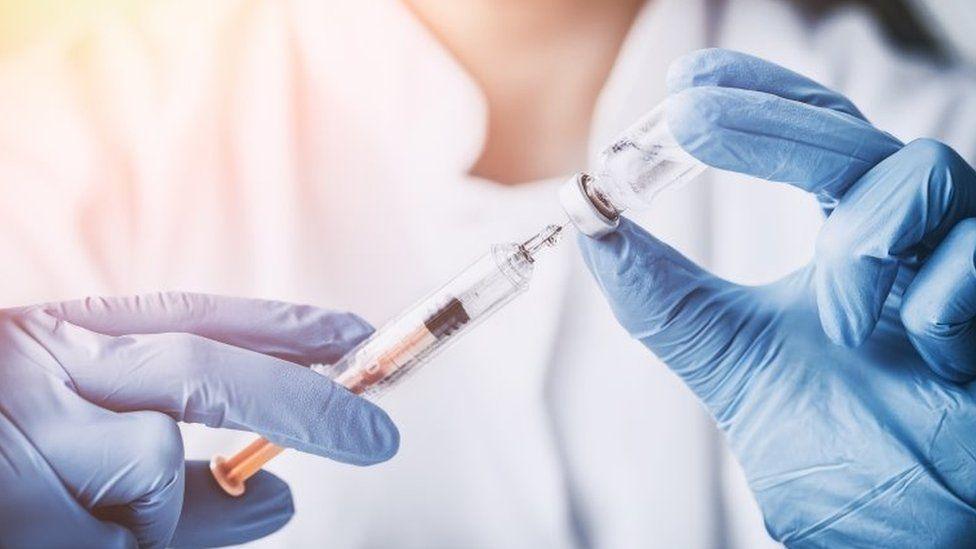Covid in Scotland: 'Patchy supply' hampering vaccine rollout
- Published
The BMA Scotland GP chief says doctors "can't plan" for vaccines
Doctors leaders say the "patchy supply" of vaccine to GP surgeries across Scotland is hampering the speed of delivery to patients.
Ministers have pledged a first dose of the vaccine to 1.4 million of the most vulnerable Scots by mid-February.
But the British Medical Association in Scotland said inconsistencies in supply made it difficult to plan patient appointments to receive the vaccine.
They also said some GP surgeries had yet to receive any vaccine at all.
The Scottish government said it was working with health boards to resolve the issues.
Currently, about 16,000 vaccinations a day are being carried out in Scotland. However, that is expected to rise significantly as efforts to deliver the vaccine are scaled up.
On Sunday, 1,341 new cases of Covid-19 were reported - the lowest daily figure since 28 December. However, the numbers being admitted to hospital have continued to rise, reaching 1,918.
No new deaths were registered.
Health Secretary Jeane Freeman has pledged that the workforce and infrastructure will be in place to vaccinate 400,000 people each week by the end of February.
The government has already announced plans for large vaccination centres in Aberdeen, Glasgow and Edinburgh.
It comes after more than 5,000 front-line health and care staff were vaccinated at the NHS Louisa Jordan in Glasgow on Saturday.
GP practices across Scotland are currently providing vaccination services to those aged over 80.

About 16,000 vaccinations are currently being carried out a day in Scotland
Speaking on the BBC's Politics Scotland programme, Dr Andrew Buist, who chairs the British Medical Association's (BMA) GP committee in Scotland, said there was inconsistencies across the GP network.
He said the vaccine deployment plan was "ambitious" and so far "good progress" had been made in giving it to priority groups such as care homes residents and front-line health staff.
However, he told the programme: "The current problem lies with the next priority group, which is the 80-plus group, which GPs in Scotland are set to vaccinate because the supply of the vaccine so far has been quite patchy.
"Some practices have a good supply, some have had none so far."
Extra vaccine doses
He said his practice had received 100 doses of the vaccine for 600 patients over the age of 80, who all needed to be vaccinated by 5 February.
He added: "I then have to do another 1,200 patients in the 70-plus group and the extremely clinically vulnerable by the middle of February, so we need to do 1,700 vaccines in the next four weeks.
"Now we can do that. We are used to providing large number of flu vaccinations and it is possible, we have our workforce in place, but we need the vaccine, otherwise we can't do it."
When asked if his practice was running out of vaccine at the end of each day, Dr Buist said: "Yes - we can't plan, that's the key thing. We can't send out appointments to patients until we're sure we have the vaccine in our fridge.
"We were given 100 doses on Monday. We used that all up by Friday. We don't want to send out appointments to patients until we know that we can definitively vaccinate them otherwise patients get very upset."

Vaccinators have reported being able to extract one additional dose from vaccine vials
Dr Buist said vaccinators were regularly managing to extract higher numbers of doses from vaccine vials despite claims that some doses were being wasted.
He said there was widespread experience of six doses being extracted from Pfizer vaccine vials, which were marketed as having five doses, while 11 doses were regularly being taken from AstraZeneca vials.
But Dr Buist criticised issues around the red tape some retired health professional had faced when volunteering to become vaccinators.
"I have reports that arrangement to get doctors and nurses back into the system have been quite bureaucratic and I think it's something we need to look at."
Vaccine ordering system
The Scottish government acknowledged that there had been delays in vaccine supplies reaching some GP surgeries.
A spokeswoman said: "GPs have a significant role to play in delivering the vaccine - and we thank them for their hard work and patience as we roll out more vaccines to those in the communities.
"We know there have been some initial delays in supply reaching some practices and are working with health boards to resolve this. Vaccines are being manufactured as quickly as possible and we will continue to explore all options available to increase supply."
The government said health boards were providing order information for their GP practices to National Procurement who in turn advised the distribution partner.
The spokeswoman added: "Once stock is released for ordering, the distribution partner inputs the GP orders on to their ordering system. Once the order has been placed, GP practices will receive an automated email providing an indication of the delivery day.
"We too want to vaccinate as many people as quickly as possible and are continually working hard to see if distribution can be made faster in any respect."

